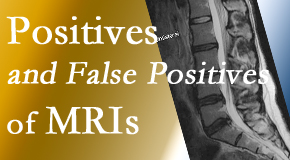MRIs - The Positives and the False Positives
Tests – what are they good for?
In the realm of back pain tests, of MRIs that question must be asked. What are MRIs good for when the proportion of constructive, influential MRI studies is so minor? False positive MRI results trouble those who receive such results. They arouse fear or caution where it’s not always warranted. MRIs like this confuse the proper treatment plan. They spend a lot of money. Shoreline Medical Services/ Hutter Chiropractic Office carefully weighs the necessity of MRI in the Groton chiropractic treatment plan of Groton back pain relief.
MEDICINE’S VIEW
MRI interpretations by radiologists often vary. The true-positive finding rate was 56.4%, and the miss-rate was 43.6%. (1) MRI imaging may produce false suspicion. When following the guidelines of the American College of Radiology, 93% of lumbar spine MRIs were appropriate. Of those, only 13% uncovered anything that needed to be addressed. Of the 36 MRIs that raised suspicion of cancer or infection, 81% were false-positive. 59% of the follow-up MRIs on those suspicious findings were false positives. (2) MRI imaging may misinform. For example, MRI demonstrates that the presence of disc degeneration in asymptomatic persons – persons with no back pain – grows with age: 37% in 20 year olds and 96% in 80 year olds; disc bulges: 30% to 84%; disc protrusion: 29% to 43%; annular fissures 19% to 29%. These imaging findings imply that these are signs of normal aging. They remind all doctors, remind chiropractors like yours at Shoreline Medical Services/ Hutter Chiropractic Office, to compare all such findings with patient symptoms. (1,3) Your Groton chiropractor does this!
CHIROPRACTIC’S VIEW
Choosing Wisely guidelines for American chiropractors recommend not repeating spinal imaging and not obtaining spinal imaging for patients with acute low back pain in the first 6 weeks of back pain (unless there are “red flags” – issues that suggest something more disturbing). (4) A review of the efficacy of the Canadian Choosing Wisely recommendations for imaging nonspecific spinal pain and symptoms reported that there is very low risk of missing a worrying cause of back pain. (5) The goal of guidelines is less imaging, fewer false positives. Shoreline Medical Services/ Hutter Chiropractic Office wants what’s best for our Groton chiropractic care patients.
COX® TECHNIC’S VIEW
Chiropractors like yours at Shoreline Medical Services/ Hutter Chiropractic Office study all the symptoms, tests and images our Groton chiropractic back pain patients [[present on|bring with them39] their first Groton chiropractic visit. So many back pain patients come to Shoreline Medical Services/ Hutter Chiropractic Office with MRI images already with them. Shoreline Medical Services/ Hutter Chiropractic Office will look at them but will rely more on clinical exam findings and correlate them to what the MRI shows. A rule of thumb with the Cox Technic System of Back Pain Relief is to work toward 50% reduction of back pain in the first 30 days of care before arranging additional imaging or testing or arranging surgical consultation. (6)
CONTACT Shoreline Medical Services/ Hutter Chiropractic Office
Listen to this PODCAST with Dr. Dan Clark on the Back Doctor’s Podcast with Dr. Michael Johnson as he describes imaging for back pain in the scheme of treatment for pain relief.
Schedule your Groton chiropractic appointment with Shoreline Medical Services/ Hutter Chiropractic Office today. Let us discover together the best path to Groton back pain relief – with or without MRI imaging!


